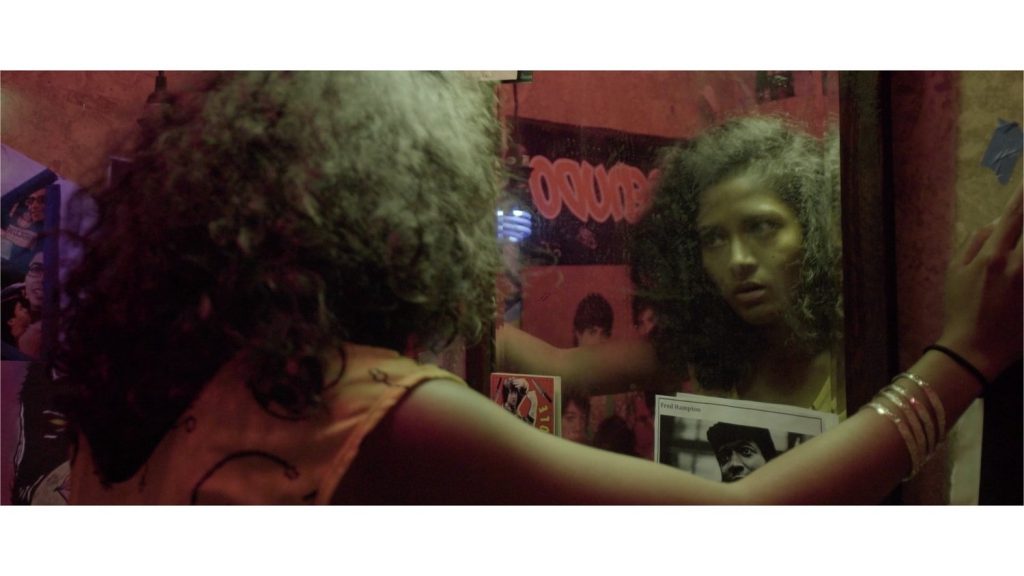
by Maryam Jameela – Follow @yammatron – 
There are only 2 minutes and 21 seconds of the trailer so far, but “Brown Girls” is easily going to be one of the best things about 2017. The new web series comes from screenwriter and poet Fatimah Asghar, and director Sam Bailey and features two protagonists in the shape of Leila, a South Asian American getting to grips with her queerness, and her friend Patricia who’s a Black American musician struggling to commit to anything.
We spoke to Fatimah Asghar about the motivations, struggles and legacies “Brown Girls” engages with:
It’s extremely rare to see a relationship between two women of color, especially each of them coming from different backgrounds, being depicted despite it being a reality for many women. The show seems to be centered around the relationship between Leila and Patricia, and how they grow from, and with, one another. What was your thinking behind that decision, and how important was it to make the choice to have their friendship as a focal point?
The show is loosely based on my friendship with my best friend, so the decision to make their friendship a focal point was very important to me. I think friendship, especially friendship among women of color, is incredibly important to me. My friendships have gotten me through many different things in my life and I don’t know where I would be without them. I also don’t feel like I get to see them represented enough in the media, and that can feel very alienating. I wanted to create a show that spoke into that void, and made these two women of color relatable to their audience. Not superheroes, not on top of everything and their careers, not rich— just everyday girls struggling to make it in the world.
With the passing of the Brexit referendum in the UK and the election of white supremacist Donald Trump, many women of color have expressed fear and terror coming into 2017. What impact do these events have on the creative process, and your relationship with your own work?
In addition to being a screenwriter, I am also a poet. I think the fear around the political stuff that is happening in the world has always factored into my art. I view art as deeply political, and as a way of resistance. I believe as artists it is our job to speak out against injustices in the world, and not only injustices that affect us, but injustices that affect many different kinds of people. I want to do my part in creating a world that is safer, especially for different communities of color and other marginalized groups that have been under fire for so long. Some of my poems are very explicit about this—they address political issues head-on. Even though “Brown Girls” is maybe less obviously political, I still view it as a political show. It is political to show the power of friendships between women of color of different backgrounds in an incredibly segregated city and country, and the ways that different communities of color can be joyous in such a politically turbulent time. When I was making the show, the only thing I wanted was to create something that my friends could laugh along with. My friends, who are amazing, who have battled through so much just to survive— I just wanted to create a little bit of joy that we could all watch together.
Two particular scenes from the trailer jumped out at me—one where someone tells Leila off for what I’m assuming is a weird looking roti, and another where Patricia is told “I’m not even gonna begin to give you a lecture about what you don’t know about feminism.” Already, a two minute trailer sets up women learning from older generations, as well as from themselves— could you talk a little bit about what it means for this kind of show which deals with joy, friendship, and, growth and explores parts of the lives of many women of colour that are practically non-existent in many media products?
I created this show because I felt like so much of my world was lacking from media representations. I don’t know if I’ve ever seen a show that feels like it represents my family, the conversations I have with my elders— my friends, parents, and my own family. I was raised by a lot of different kinds of people, mostly women. I think usually when we see shows about immigrant families, the characters can come across as one-dimensional and stereotypical. I didn’t want that. I wanted a show that had relationships that felt real to me. My best friend, Jamila, is as much a part of my family as my own sisters. Everyone in my family treats her like family. And the same is true for her family— I had my first real Christmas with her family, and Kwanza, and I watched my first whole Super Bowl game with them. It was really important to me to show the ways that our communities work and love and grow. I hope that comes across when people watch the show.
 Maryam Jameela lives in Lancashire, England. She graduated with a B.A. in English literature and an M.A. in gender studies. She is passionate about writing all things desi and will begin her Ph.D research into desi film and literature at the University of Sheffield, U.K. in the fall. You can read more things that she has written here.
Maryam Jameela lives in Lancashire, England. She graduated with a B.A. in English literature and an M.A. in gender studies. She is passionate about writing all things desi and will begin her Ph.D research into desi film and literature at the University of Sheffield, U.K. in the fall. You can read more things that she has written here.




